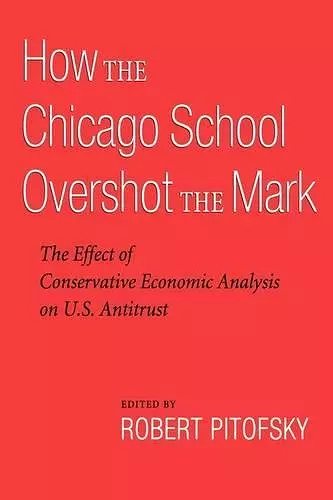How the Chicago School Overshot the Mark
The Effect of Conservative Economic Analysis on U.S. Antitrust
Format:Paperback
Publisher:Oxford University Press Inc
Published:25th Sep '08
Currently unavailable, and unfortunately no date known when it will be back
This paperback is available in another edition too:
- Hardback£127.50(9780195372823)

How the Chicago School Overshot the Mark is about the rise and recent fall of American antitrust. It is a collection of 15 essays, almost all expressing a deep concern that conservative economic analysis is leading judges and enforcement officials toward an approach that will ultimately harm consumer welfare. For the past 40 years or so, U.S. antitrust has been dominated intellectually by an unusually conservative style of economic analysis. Its advocates, often referred to as "The Chicago School," argue that the free market (better than any unelected band of regulators) can do a better job of achieving efficiency and encouraging innovation than intrusive regulation. The cutting edge of Chicago School doctrine originated in academia and was popularized in books by brilliant and innovative law professors like Robert Bork and Richard Posner. Oddly, a response to that kind of conservative doctrine may be put together through collections of scores of articles but until now cannot be found in any one book. This collection of essays is designed in part to remedy that situation. The chapters in this book were written by academics, former law enforcers, private sector defense lawyers, Republicans and Democrats, representatives of the left, right and center. Virtually all agree that antitrust enforcement today is better as a result of conservative analysis, but virtually all also agree that there have been examples of extreme interpretations and misinterpretations of conservative economic theory that have led American antitrust in the wrong direction. The problem is not with conservative economic analysis but with those portions of that analysis that have "overshot the mark" producing an enforcement approach that is exceptionally generous to the private sector. If the scores of practices that traditionally have been regarded as anticompetitive are ignored, or not subjected to vigorous enforcement, prices will be higher, quality of products lower, and innovation diminished. In the end consumers will pay.
Chairman Pitofsky's timely book teaches us important truths about antitrust. This book convincingly rebuts the Chicago School approach to economics and competition policy while reminding us that the antitrust laws, when effectively applied, are robust tools that enhance competition and benefit consumers. Chairman Pitofsky and the other distinguished contributors provide a badly needed counterpoint to the excesses of Chicago School economic theory that has led to an overly hands-off and lifeless approach to antitrust enforcement in recent years. This excellent volume should be studied by all those who care about competition policy. * Senator Herb Kohl *
Into the grand antitrust debate between Warren Court advocates, on the one hand, and the treatises and court opinions out of the Chicago School tradition, on the other, comes finally a voice of reasoned moderation * or rather a full-throated chorus of such voices. With a clear-eyed regard for the paramount importance of consumer welfare a the central governing principle of antitrust enforcement, this collection of essays deserves to be read carefully by practitioners, academics and politiciansbut especiallyand exceedingly carefullyby federal judges all across the country, not least of all by the current justices of the U.S. Supreme Court.John Shenefield, Former Assistant Attorney General for Antitrust *
When they asserted efficiency as the new benchmark of antitrust, the scholars of Chicago paved the way to very welcome developments. But efficiency is more and more treated as an ideology and therefore it leads to forgetting the facts and restoring presumptions. If avoiding false positives becomes the priority of antitrust, how many real negatives will receive undeserved immunity? The questions raised by this book are no less timely than those raised by those scholars forty years ago and deserve no less attention from practitioners, academics and judges all over the world. I am confident that some copies of it will also be available in the library of the U.S. Supreme Court. * Giuliano Amato, Former Prime Minister of Italy *
This collection of essays * by lawyers and economists, many of whom are former antitrust enforcement officialswill generously reward a close read by anyone who is interested in the current intellectual state of antitrust thinking. As largely a critique of recent legal decisions and of recent enforcement, these essays are likely to form the basis for new directions for antitrust in the coming decade.Lawrence J. White, Professor of Economics, NYU Stern School of Business *
ISBN: 9780195339765
Dimensions: 231mm x 155mm x 23mm
Weight: 476g
328 pages